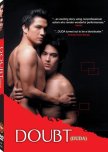
Was this review helpful to you?

This review may contain spoilers
Ideia interessante com desenvolvimento superficial
Primeiramente, quero falar que achei a premissa do filme muito boa e bastante inovadora. Com o avanço no desenvolvimento das inteligências artificiais, a temática de Wonderland é, no mínimo, interessante.Outro ponto positivo é a escolha do elenco. Ao meu ver, os atores e atrizes conseguiram atuar de maneira bastante honesta e puderam extrair o melhor de cada personagem. Já conhececia alguns, então já comecei a ver sabendo que as atuações seriam promissoras.
Por outro lado, acredito que o desenvolvimento da história ficou muito superficial em alguns momentos, pois trabalhar vários enredos requer tempo, o que julguei ser complicado em apenas 1h55. Com isso, parecia que algumas histórias estavam sendo inseridas apenas para completar a minutagem, pois não agregaram nada ao filme, no geral.
Não entrarei em maiores detalhes, mas penso que seria melhor, caso tivessem focado em contar duas histórias, no máximo. Na minha opinião, poderiam ter focado mais na história do casal Jeong In e Tae Ju. Tentar responder perguntas como: o que de fato aconteceu com ele; como foi isso; a partir de que momento a Jeong In resolveu contratar o serviço da Wonderland.
Além disso, também acho que poderiam ter trabalhado melhor a história da Bai Li. Explorar melhor a relação dela com a mãe e com a filha, descrever como a "rebeldia" dela impactou no serviço da Wonderland, mostrar o que aconteceu depois.
Por fim, concluo que o filme foi uma ideia muito legal, mas com pontas soltas e momentos que poderiam não existir, pois não acrescentaram nada à obra.
Was this review helpful to you?

This review may contain spoilers
Es mucho más, incluso, de lo que supieron vender
A ver, no me entiendan mal, creo que la productora ha sido capaz de vender muy bien la obra para su mercado objetivo principal, que es el Tailandés, pero podría haber conseguido mucho más si se lo hubiera propuesto. Contaba con los talentos, con el presupuesto y con el guion para conseguirlo. Una pena que quede como otra pieza más estrenada en el montón de obras que Netflix añade a su colección.The Paradise of Thorns es una historia sobre violencia sistémica tanto como es un relato sobre la codicia, sobre el poder y sobre el concepto de víctima. Si lo que buscas es un BL al uso, esta no será tu historia. Solo es una cara más de una historia compleja que nos muestra la peor cara del ser humano. Jeff está sobresaliente, pero también Engfa, Srida y Keng.
Probablemente, una de las mejores películas del año 2024.
Was this review helpful to you?

eu amei
gostei bastante do filme, teve um bom desenvolvimento, a historia foi me conquistando aos poucos e o que falar do protagonista?? me faltariam muitad palavras pra descrever o quão bem ele atuou.A forma como ele foi se apaixonando cada vez mais e querendo fazer parte de um deles me deixou bastante feliz, achei bem a cara dele. E os amigos o ajudando foi a coisa mais fofa do mundo. Desistir de pegar um criminoso nunca foi uma opção e isso te encanta muito no filme.
enfim veria novamente, é perfeito, um bom filme pro fim de dia.
Was this review helpful to you?

a story without voice or sound ✨
finished 9.5/10 🌟It's a very nice movie with a simple script and beautiful characters, I applaud the main cast for their hard work in sign language, they did very well, It is not a very easy job 👏
Beautiful photography, direction and music
The ending has a very interesting and beautiful plot list, I recommend this movie 100%
ps: I look forward to the leads doing a romantic drama together because they have a lot of potential! I need more of them I'm obsessed in a good way 🤭
Was this review helpful to you?

Não precisa pôr nem tirar
Do começo ao fim, achei sem defeitos.Me senti assistindo a um vlog daqueles que a pessoa quase não fala, isso no sentido de que o ator principal parecia não estar atuando, mas mostrando sua própria rotina (atuação 10/10 pro Koji, que profissional incrível).
Uma vida simples, mas cheia de gratidão. Nada de grandioso acontece, mas não precisa, e essa é a vida que a gente espera ter - na simplicidade, mas que difícil é.
Assistir a esse filme é como sentar em um lugar calmo e observar tudo o que existe em volta, mesmo que não seja quase nada, apenas uma árvore balançando seus galhos. É aquele respiro que a gente quer dar depois da correria e do nosso imediatismo. A esperança que encontramos para sermos pessoas melhores nos inspirando no protagonista, que vive um dia de cada vez.
Uma história que podia seguir por caminhos diferentes, mas que se deu ao trabalho de - não, não vamos desenvolver isso, vamos seguir sem mostrar nenhum desfecho -, de forma que não seguiu com nada mirabolante, e pra mim isso foi incrível. É um recorte da vida de uma pessoa que, mesmo que tenha problemas como qualquer outra, não deixa de ser feliz e vive no contentamento. Pareceu muito real pra mim.
Duas horas se passaram como num piscar de olhos. Fiquei com vontade de mais, mesmo que esse "mais" fosse a mesmice de cada dia.
Was this review helpful to you?

carino, ma finale boh
Brave Citizen, movie del 2023Voto personale 7,5
"Un'ex campionessa di pugilato ora lavora come supplente in una scuola superiore e che, dopo aver assistito a violenze intollerabili, decide di farsi giustizia da sola"
Bel cast e anche la storia, forse avrei gestito il finale in maniera diversa, ma nel complesso, lo consiglio.... Vi lascio il link
https://ramaorientalfansub.tv/watch/brave-citizen-movie/.
Was this review helpful to you?

This review may contain spoilers
Uma obra incômoda!
Honestamente assisti pela atriz Park Gyu Young, no entanto, desde o início do filme foi muito difícil para mim manter a calma. É um filme pesado com cenas de violência e assuntos delicados. A personagem literalmente é violentada e isso foi a gota d’água para mim. Tudo gira em torno do bullying que o protagonista sofre e como suas atitudes fizeram a vida de outra pessoa um inferno. Tudo isso ocorre para no final não levar a lugar algum! De verdade, foi nojento e repugnante assistir esse filme. Talvez fosse esse o objetivo de quem roteirizou e dirigiu esse filme, mas não foi algo que me deixou pensativa ou tenha me impactado, positivamente ou negativamente, eu apenas fiquei enojada. São cenas angustiantes e toda essa tortura não tem um desfecho. É apenas o final de um filme que não tem um final da história apresentada.Não recomendaria para ninguém assim como não assistirei novamente nunca.
Was this review helpful to you?

MAMPUS LU!
Puas banget liat endingnya.Ini kan yang lu mau, Mo?? Punya rumah dan perkebunan duren segitu leganya hasil ngrebut dari laki bajingan lu itu? Terus abis itu apa?? Konsekuensinya lu sendirian njirrr. Bisa lu ngurus tu kebun sgtu luasnya sndirian?? Mana adik lu juga mati gegara suami pilihan lu. Lagian lu ngapa pake kawin segala sih?? Udah bener jadi independent woman aja.
Sebenernya kalo di track siapa yang benar dan siapa yang salah tuh sulit sih karena Mo punya motivasi sndiri untuk melakukan tindakan keji itu. Gue ga membenarkan tindakan dia, tapi ya gue ngerti kenapa dia begitu.
Yang bneran kasian tuh Thongkam. Dari film ini gue bahkan baru tau kalo di Thailand aja pernikahan lgbt ga diakui. Iya lu ngadain wedding party, tapi secara hukum? Cuma dianggap partner anjir... Nyesek banget taik.
Terus Jingna... Gurl, I really want to meet you again in the other chance (with Kam). You don't deserve to die istg. In the other live, gue pengennya lu ketemu duluan sama Kham biar dia terbebas dari lelaki bajingan itu.
Tapi keknya we're all agree that Jeff Saturn is the cuntiest durian farmer ever
Was this review helpful to you?

vale cada lágrima.
queria me apaixonar igual eles, um amor puro e singelo.nunca chorei tanto assistindo um filme mas vale muito a pena
oq torna mais especial é os atores principais serem casados na vida real
pra sempre meu filme favorito da vida!! todos deveriam assistir essa obra de arte
Was this review helpful to you?

This review may contain spoilers
Desvendar o oculto é doloroso.
Inteligente, amável, gentil... Esse era o Hoshikawa. E ele merece ser apreciado. A medida que os pontos de vista são apresentados, somos imersos em reviravoltas cada vez mais esclarecedoras, trazendo a tona sentimentos que no início do filme, nem imaginaríamos sentir. Lá no ponto de vista da mãe do Minato, temos um Hoshikawa enigmático, com atitudes incompreendidas e com marcas no corpo. Que marcas são essas? Quem as fez? Bom, para o professor, temos um Hoshikawa que está sofrendo violência escolar e tudo nesse ponto parece ser claro como o dia. Mas não é. Está bem longe de ser. No ponto de vista do Minato, Hoshikawa é adorável, indefeso, despertando nele a vontade de cuidar, porém o medo de ser discriminado por isso ainda paira sobre ele. Sentimentos são desenvolvidos e ali podemos ver tudo que estava oculto no início e meio do filme. Tudo agora é tão visível que chega a ser doloroso. Perceber que o Hoshikawa sofre em casa causa uma imensa tristeza. É sufocante perceber que ele não revidava as intimidações na escola pois se sentia merecedor daquilo. E ele não merecia. Mas se deixava agredir. Sorria. Justificava com o olhar as atitudes das outras crianças. Hoshikawa era tão frágil, tinha o desejo de renascer pois acreditava que de fato havia algo errado com ele. "Nós renascemos?" Não. Você não precisa. Nunca houve nada de errado com você.Was this review helpful to you?

Dreaming films, telling stories, opening paths, making history
Many years before December 23, 2003, Crisaldo Pablo decided to embark on an adventure. Its main motivation: "cinema and the Filipino LGBT+ community and, why not, also that of the other side of the border," the recipients responded in chorus at the time. Even today, more than 20 years later, they repeat it.To do this, he gathered a group of friends and some professional actors who said "Yes" in unison. He raised some funds, very few, in truth, from his own pockets, or from donations from people who supported the idea.
He summoned his friends, most of them homosexual, like him, those with whom he shared the same dream: promoting a gay cinema through the filming of artisanal films; He wanted to raise awareness of LGBT+ people among the Filipino population. This is how he outlined his venture.
«There is a very special magic in the artistic object that you achieve with your own hands. It may be imperfect, but that difference makes it unique. That feeling of uniqueness is what a creator feels, whether with a story he wrote or a film he shot," he convinced others with this certainty.
Due to the low budget he could afford, he wrote a script without great needs and expenses. Knowing that he would use an unconventional production method, which would only have scarce production resources, he decided to film in a few locations, only in those real places known to all those involved, and discarded the ideas of large stages or sets built from papier-mâché and other unnecessary artifices.
He planned to film wherever necessary, without asking for the relevant permission. He borrowed a Sony VX from a friend. In a moment of breakdown, he had to rent another digital camera, one of those that you can find today in museums or in the yellowed pages of magazines of the time.
He went out to the streets, to the theaters, to the workshops where actors and actresses are trained. He accidentally stumbled across Amanda Virrey, a young woman who would later appear in the films 'Compound' (2006) and 'Sa kamay ng Diyos' (2005), with Larry Burns, a young man who would never again be in front of a camera, with Bell Clerigo, the actress who in 2009 would appear in the film 'Boylets', with Arnold Reyes, who would later star in the two seasons of 'Papa, What Is Love?' and the film The Commitment (2014), with a homosexual theme.
Likewise, it added experienced actors and actresses, such as Jojo Nones, known for his role in 'Dear Uge' (2016), 'Mga lihim ni Urduja' (2023) and 'Agimat ng agila' (2021); John Lapus, who had already participated in 'Mahal Kita: Final Answer' in 2002, and in 1997 in 'Ang Pulubi At Ang Prinsesa'; Rey Pumaloy, known for his role in 'Buko pandan' (2002), 'Sa iyong mga haplos' (2001) and 'Muling umawit angtuvo' (1995).
As protagonists it would have Andoy Ranay, a professional actor who was already known for his films 'Markova: Comfort Gay' (2000), and 'Soft Hearts', with which he debuted in 1998, and Paolo Gabriel, an unknown who would never return be under the direction of a filmmaker.
Since then, he began holding summer camps-workshops for young people on presentation and acting on social networks and independent films and production management for independent projects.
Wait to make profits from sales and distribution of the resulting product? Do you wish that the film would go down in the annals of the history of Philippine cinematography as one of the most watched by the public? Do you aspire to present the film at film festivals both inside and outside the borders of your country? Quite a dream, the same one that every filmmaker has, especially when they embark on the path of artistic creation for the first time.
With 'Doubt' (Doubt, in Tagalog), his debut film, filmed in 2003, Crisaldo Pablo was not only making films. I was making history. He was filming the first feature film shot digitally in the Philippines. With a raw and independent approach, he was making guerrilla cinema. I was making the LGBT+ community visible in a homophobic and conservative society.
In this brave film from an independent team, the pioneering filmmaker of Philippine guerrilla cinema addresses for the first time in his extensive filmography themes such as homosexuality, promiscuity and infidelity in a homosexual relationship, while telling a story about a driven film director for an idea to film a film, against all odds, and create a significant statement that resonates deeply within a heteronormative and patriarchal society.
'Doubt' is recognized as the first full-length digital film ever filmed in the Philippines. The comments of Cris Pablo and some of the actors who appear in the "making of" of the DVD demonstrate how much dedication to a vision represented in this small and essential film.
With an autobiographical approach, for the first time in one of his films, his main character was called Cris. Then would come Jet Alcantara's Cris from 'Bathhouse' and Cris Vicente from 'Moreno', played by the director himself. Curiously, in the 2009 film 'Showboyz', the main character is named Krys, and is played by Filipino actor Kristoffer King.
It was also the first time that Crisaldo Pablo had to fight battles against censorship, challenging, confronting and defeating the Philippine government's Film Board, when the film was originally given an X rating, which would have prohibited it from being shown in theaters. Finally, it was able to receive the desired R-18 rating. He had to do similar actions before the release of his later films 'Bathhouse' (2005) and 'Moreno' (2007).
In this faux-autobiographical docu-drama with healthy doses of interpersonal kitsch, a group of friends and acquaintances discuss the relationship of the film's central couple, in response to the frequently repeated and absorbing question: "What do you think of Cris and Eric?
Everyone is worried and reflects on the fate of the relationship while watching the existing romance between the two young protagonists collapse.
Cris (Andoy Ranay) is a documentary filmmaker with a recognized body of work and a large community of friends and admirers. A gay man in his thirties with a voracious sexual appetite, he has never had a serious relationship and, throughout his fifteen-year sexual career, he claims to have had sexual relations with more than 4,000 men. But after falling in love with Eric (Paolo Gabriel), a twenty-something tabloid television news reporter, Cris has given up meaningless sex for the pleasures of monogamy, much to the surprise of his wide circle of gay friends.
For his part, Eric sees a space for a more open relationship (of course, they don't talk about this) and is baffled by Cris's jealousy.
Much of the story unfolds by showing simultaneous television talk shows, one about Cris's life and the other about Erick's adventures.
The friends automatically go from joy at the change in Cris's life to distrust of Erick's fidelity. Doubt arises and Cris confronts Erick for staying away from home too long, a factor that makes the experienced Erick feel outraged by Cris' constant jealousy.
Complicating matters is the appearance of Ben (Warren de Leon), a former lover of Cris, who makes one last attempt to rekindle the fires of past passion before marrying a girlfriend, but young Cris rejects his advances.
All of the above gives rise to his friends observing from a distance, while they speculate about what is happening between Cris and Eric.
Although the film moves away from the open emotionalism of the couple involved, what 'Doubt' lacks in intensity seen in other films that explore homosexual relationships, such as 'Cheun gwong tsa sit (Happy Together', 1997), by Wong Kar-Wai, Pablo's film almost makes up for it with its free look at the vital gay community of Manila, the Philippine capital.
'Doubt' goes for the intimacy of a home movie rather than the sleaze of porn, with cleverly manipulated beachfront nudity thrown in for good measure.
In fact, when Cris, driven by jealousy, frustration and despair at seeing the relationship crumble, attempts to commit suicide, the viewer suffers an apparent hallucination in the form of a media mockery of egocentrism: an elegant talk show in garish candy-colored colors where a group of magical guests in sequined outfits are interviewed as they try to answer the question on everyone's lips: "What do you think of Eric and Cris?"
The astute viewer will be able to find in the DVD extras the director expressing that his script was based on his own relationship experiences and those of his friends. Likewise, he declares that if he had stuck more closely to them, he could have made a better film. Instead, it adopts a soap opera style of storytelling from the start, with increasingly tense emotional crises, overacted by its largely inexperienced and unprofessional cast; rapid changes in emotional direction; a tangle of plot threads, not all of which go anywhere, and some very strange directorial decisions about how to try to make sense of it all in the end, and each successive emotional crescendo is followed by a cut to black.
Towards the ends, Pablo's response is to establish a television talk show format in which the hosts and Cris and Eric's friends discuss the couple's relationship.
Despite these failures, 'Doubt' has many positive qualities. The flashback sequences are filmed in black and white in a grainy, semi-focused manner that allows the theme of sensuality to be presented in a surprisingly subtle way. Taking into account that the film is shot with a digital camera, the flow is fluid and the feeling is one of immediacy and spontaneity.
Andoy Ranay draws a compelling three-dimensional character we can identify with: a man approaching the age of being "undesirable" in the gay world of the Philippines.
The rest of the cast, although not very skilled in their performances, offers a committed work, achieving as a whole a somewhat rough but ultimately honest and creative film about the public and private pain of homosexual relationships.
Was this review helpful to you?

'Moreno', between polygamy and absent monogamy
Already in 'Doubt' ('Duda, in Tagalog), his debut film filmed in 2003, and in 'Bathhouse' (2005), his second film, Crisaldo Pablo addressed topics such as promiscuity, infidelity and homosexuality.In 'Moreno', in Tagalog, (translation: 'Bronze'), a 2007 film shot on digital video, the pioneering director of Philippine guerrilla cinema addresses infidelity in a homosexual relationship, and compares its consequences with the marriage traditions of a poor town on the margins of civilization.
Characterized by its low budget, the intervention of a small number of actors, mostly non-professionals; an unconventional production method, few resources in production, a script without great needs and expenses, few locations, predominating real places to the detriment of sets built for filming; filming wherever necessary without asking for the relevant permission, filming with reduced technical and artistic teams, 'Moreno' follows a raw and independent approach to the so-called guerrilla cinema, as Pablo did in his debut film 'Doubt' and in his second film ' Bathhouse'.
In 'Moreno', its director chooses to demonstrate that he is capable of bringing homosexual relationships to the public eye and making the viewer care about the characters he develops.
Its main protagonist, Cris Vicente, is a documentary filmmaker who is going through difficulties in his romantic relationship with Denver (Ray An Dulay, 'Bathhouse'), his long-term partner.
While Cris tries to improve him relationship with Denver, Denver likes to be unfaithful to him boyfriend. Despite loving Cris deeply, Denver feels the need to look for lovers with whom to share him daily life. At the anniversary party, Denver drugs Cris so he can have a clear path to participate in an orgy with all her male guests, while Cris is unconscious.
The opportunity to leave behind his recent dark past is presented to Cris when the next day he must leave for Lake Sebu, in South Cotabato, to fulfill the assignment of documenting the traditions of the people of T'Boli, specifically making a profile on local women and their changing opinions on multiple marriages.
Waiting him in T'Boli is a woman Mawen (Ynez Veneracion, 'Retaso' 2007), his old friend, who serves as a link between the film company and the inhabitants of the coastal town.
Mawen's husband is also blatantly unfaithful to her, and his situation mirrors that of the cuckolded filmmaker.
The film leads the viewer to reflect on the polygamy of the town's inhabitants and, on the other hand, the absent monogamy of Denver.
Consider the last-minute twist involving Cris and his boss, which turns out to be too much of a coincidence to be believable.
Cris is also aware that one of the male villagers is bothering him. During filming, Cris forgets that he is supposed to be objective and becomes personally involved in the lives of several young women who are engaged to the Datu sa dokyu (Wings Lock), the village patriarch.
The Datu, as the richest men in the village are known, are allowed to have dozens of wives, forced by their impoverished families into marriage against their will to live a life of servitude in exchange for a dowry.
Thus, once again, another disturbing and undesirable view of marriage is presented to the public.
When Ngapon, a young T'boli woman, tells Cris that she wants to free herself from the marriage established by her parents and go to Manila, the main character begins to confront what she left behind in the city. Like the proud Datu with many wives, Cris remembers that he has Denver, his tanned-skinned lover in Manila, who is proud of his many relationships. Ngapon's search for freedom becomes Cris' journey into a dark and very sad past.
However, the experience lived in T'Boli will allow Cris to solve his relationship problem and find the only and correct answer.
With an autobiographical approach, in three of Crisaldo Pablo's films his main character is called Cris. Thus we have Jet Alcantara's Cris from 'Bathhouse', Andoy Ranay's Cris in 'Doubt', and Cris Vicente from 'Moreno', played by the director himself.
Curiously, in the 2009 film 'Showboyz', the main character is named Krys, and is played by Filipino actor Kristoffer King.
Accustomed to fighting battles against censorship, Crisaldo Pablo challenged, confronted and defeated the Philippine government's Film Board, when the film was originally given an X rating, which would have prohibited its exhibition in theaters. Finally, it was able to receive the desired R-18 rating.
Among the mistakes of 'Moreno' we must point out that the dynamics of Cris and Denver's toxic relationship are interesting and should have been explored more. When the story leaves Manila to unfold in T'Boli, it seems as if we left one film behind to watch another.
Although at the beginning Cris frequently remembers Denver's moments of infidelity and the viewer witnesses the slow disintegration of her marriage through some very effective flashbacks, these disappear towards the middle of the film and do not reappear until its climax.
All of this prevents the story in the coastal town from developing organically and effectively, leaving the viewer with what appears to be a very choppy documentary. The reaction of the public that criticizes the lack of a structured story with fully represented dramatic peaks is logical.
Among its successes, we can highlight that the film is capable of showing homosexual couples who have the same problems and struggles that heterosexual couples face; the director develops interesting gay male characters who are not the stereotypes of macho dancers, rent boys or drag queens very common in Filipino LGBT+ themed films.
The first act of the film is very attractive. It's also surprisingly explicit and features a lot of frontal male nudity.
Crisaldo Pablo's work is thought-provoking and encourages the viewer to hope that the characters will be successful in their relationships and achieve a sense of peace and satisfaction in their lives.
The beautiful photography by Jonathan Batoy, Claude Santos and Crisaldo Pablo himself show village scenes and virgin, exotic landscapes that can, in themselves, stimulate the senses.
Despite its low budget and murky night photography, Pablo shows a good eye for the cinematic image. The scenes involving Cris and Denver give the symbolic image of a couple breaking up. Equally striking is the Bergman-style image that almost functions as a split screen in which Cris is sitting, dejected, on one side of a wall, while Denver lies in bed with another man at the other end.
The difference in the men's attitudes is also conveyed by their contrasting appearances. Cris's appearance is average, while the flirtatious Denver usually appears bare-chested and sports a shaved head with a light tuft of beard on his chin.
Isha's low-key, ethnic music, usually consisting of a single repetitive note, effectively sets the mood of the characters in each of the flashbacks.
'Moreno' confirms Cris Pablo as a pioneering figure of the guerrilla style in Philippine cinema, a filmmaker who has turned his cinema into an integral pillar of Filipino, Asian and world independent cinema, celebrated for his ingenuity, authenticity and unfiltered vision, by that gives it a documentary touch.
Was this review helpful to you?

Was this review helpful to you?

An essential Chinese political-erotic drama
The images run before my eyes once again. I resist filling the blank page with my ideas. I fear that on this occasion, as on so many others, I will not be able to say everything about this political-erotic drama full of nuances and trust, that something will get stuck in my throat and I will not be able to express what I feel correctly.Next to me lies, open to its last page, a volume of the story by writer Wang Xiao Bo, who became co-writer, which tells a story of oppression and torment set in a time and place where people were criminals if they were part of the community LGBT+. To understand what happens before my eyes, I need to drink from its most intimate and pure essences. That's why I go to the book as well as the movie.
I think I see A Lan before me touring the two parks, the East Palace, the West Palace, with its public bathrooms, more than in search of sex with other homosexuals, trying to bump into the policeman he has fallen in love with. . It all happens there, behind the Forbidden City, behind the doors of the Palace, in Beijing.
It's 1996 and Zhang Yuan, the Sixth Generation filmmaker, comes to my aid to tell me the story about a repressed and latent homoerotic relationship between a "master and a slave". I enjoy the intense and dark author's chamber piece that leads me to learn about the relationship between an openly gay writer and a police officer who refuses to accept himself because he is overcome by a strong internalized homophobia.
I glimpse Xiao Shi, the handsome man with big hands, those hands that A Lan loves so much, how he fulfills the young gay writer's dreams of being arrested and interrogated by a police officer, it doesn't matter to him if it's for "vandalism".
I witness Xiao Shi go from initial repulsion to fascination and finally attraction. I judge that the accusation of intolerance is not intended to be limited to the Chinese government, but rather to that which is manifested in all parts of the world regardless of the political regime of a given country.
I distinguish before me eros, death and sensuality walking the avenues towards sadomasochism. I sense a possible reconciliation and even the beginning of a romantic relationship between the gay writer and his captor.
I discover in Jian Zhang's beautiful photography how two worlds collide. I notice the back and forth, the initial imbalance of power between victim and executioner. I notice how the power dynamic changes between these two people over the course of a single night, in the middle of an interrogation.
I experience that the writer, from his playful kiss that left the policeman perplexed, to the confrontation between the two moments before the final credits roll, never gives up or shows signs of self-pity.
The images run before my eyes once again, and allow me to appreciate that the effeminate and masochistic, who may seem submissive, transforms, towards the middle of a film that equally transforms into both a power game and a gender performance, upon receiving the freedom granted by Xiao Shi to tell the story of his life.
I enjoy how he manages to turn the interrogation room into his own stage, where he is not only able to spread his wings and fly, but also to shout his love to the police officer.
I evaluate the analysis of gender and sexuality, the replay between pain and pleasure. I recognize myself, like so many others, in the feelings expressed in this film. I appreciate how A Lan can express that she could be a man or a woman, a goddess or a prostitute, the thief in love with her jailer.
I watch as the prisoner assumes the position of power and completely dominates (and even hypnotizes) his captor and all the spectators. And if there is one complaint, it is the script, for not giving a writer, like A Lan, more power over his words to counterattack the uniformed man, and only repeatedly using a single reason: "It's not disgusting. It's love. You can find me despicable, but my love is not".
I appreciate in the film the use of Piaget's genetic psychology and his atmospheric Fassbinder.
I allow myself another regret, the last one, I assure you, but one that affects the film not being much better than it already is: unfortunately, Hu Jun does not always seem to know what to do, how to function in front of the cameras, while his interest in the life story of the homosexual man he interrogates is not given the necessary nuance.
However, I vibrate as I listen to A Lan reply to the policeman, "You've been asking me this whole time. Why don't you ask yourself?" In this way, 'East Palace, West Palace' returns to itself the institutional inquisition that pursues queerness, asking about its own queer nature.
I open my eyes as the film plays with the limits and rules of attraction and seduction as one man's story becomes another's gateway.
I compare the film with that experience that we have all had of risking everything for the opportunity to be ourselves, whether in the search for love, sex, happiness, or simply those moments of connection with other people who can feel like oneself.
I sharpen my senses about how the film also explores the complicated relationship between gay men and the desire to feel loved by those in power, both in the figure of a law enforcement official and in that of the rich daddy that the writer once followed to his house, to receive the burning of the lit cigarette butt in his chest.
I believe that by turning the police interrogation process into seduction, Zhang Yuan's film subverts expectations as expected, and crosses the borders between pain and pleasure, between hate and love.
I distinguish that the emotional structure of the story and the enthusiasm that Si Han and Hu Jun put into expressing their lines make this film moving, beautiful, and shocking. It is a triumph for those who were handcuffed and imprisoned for their sexual identity.
I estimate that it is in that moment, as well as during the 90 minutes of footage, that we can appreciate queer cinema at its maximum expression of gay liberation, a political cinema at its most subversive and resistant, while analyzing how malleable the presentation of the human being to the world. Because the film also fulfills its objective of functioning as an intriguing experiment on the clash between the State and personal space, between the public dimension and private life.
The images run before my eyes once again, and I notice how the cut scenes, in magnificent and precise flashbacks, fill in the missing story of the mysterious writer's past of suffering.
I thus learn about A Lan's hidden desires at school, her relationship with her mother, the sad existence of "Omnibus" (Vicki Zhao), her classmate that anyone can ride; the public shame that the homosexual suffers, his first sexual experience, his furtive encounters in abandoned places with other gay men; how pain has led him to be the person he is, how he has preferred pain rather than being ignored...
In this way I understand the dreamlike epiphanies of the androgynously stylized Chinese theater, whose images also roll before my eyes.
I do not lose sight of the fact that through questions and answers the tumultuous life of the person questioned since his childhood is narrated, the difficulties that come with being homosexual in China, and how the brief intimate scenes of A Lan's life blur the feelings of the man who wear uniform.
I resist the idea that this gay film was written and directed by a straight filmmaker, especially since the portrayal of the queer character is riddled with stereotypes.
However, I applaud that 'East Palace, West Palace' escapes the stereotypical view of narcissistic heterosexual directors, and doesn't tell us one more tearjerking trope about the story of a sad, lonely queer man who has been oppressed all his life and accidentally falls for himself. falls in love with the apparently "straight" police officer who tortures him, because one of the strengths of the film is to present as the protagonist a homosexual character who has almost disappeared in conventional cinema on a global scale due to the horrific process of assimilation of the community and gay culture.
In this sense, Zhang Yuan uses all the queer expressions and traits that are most irritating to heterosexuals. He never sugarcoats the young writer's life and experience of sexuality, to interrogate the very core of homophobia and internalized homophobia, that self-hatred that the character played by Hu Jun feels towards himself.
I see the loud cry for help, both political and sexual, which in this case go hand in hand.
I see the amazing and moving performance of the real-life gay man. I was amazed to learn that Si Han was there as part of the technical team and was only chosen because the supposed protagonist dropped out at the last minute.
The images run before my eyes once again. Contrary to the way Western critics try to frame the film, I don't think the film criticizes the "authoritarian government". Firstly, there are no major differences between how an American LGBT+ film from the 90s criticizes the way society and the state approach homosexuality and what Zhang Yuan's film examines.
That's not to say it's all the same, but simply that certain sections of the public would like to use what was shown in 'East Palace, West Palace' as evidence of some specifically unique and more terrible oppression in China.
The truth is that just by watching the film, I do not feel or see the supposed repression that Western propaganda seeks to impose, ignoring, in the process, the realities of nearby countries. Clear example of political motivation.
I resist the idea that the topics presented are intended to explicitly attack China. However, obviously the film does talk about what is accepted and what is not accepted within any society, in this case the Chinese one.
But A Lan himself raises his voice at this, and expresses (paraphrasing): "we are all different and we walk at our different paces, but we are identical." That is, the repression suffered by the main character throughout his life can be similar to that suffered by any homosexual in any heteronormative and patriarchal society.
Even in societies that are supposedly more liberated with respect to homosexuality, such as the United States, from the beginning of 2023 until today there has been an unparalleled process of legislative violence and regression in the human rights of LGTB+ people.
I am referring to the approval of anti-LGBT+ laws by different states that openly limit different facets of the rights of said community, which aim to put the members of this group back in the closet, and which will begin in 2022 when Ron DeSantis, the governor of Florida, approved the Don't Say Gay Bill, whose text prohibits teaching any educational content related to sexual orientation or gender identity to students between 3 and 17 years old, and requires that the educational curriculum necessarily define he sex as "determined by biology and reproductive functions" and gender as "binary, stable and fixed".
I believe it is necessary to make these distinctions because too often legitimate criticism is used by opponents as incendiary ammunition. It would be an injustice to this film if it were used like this.
The images flash before my eyes once again, and I hear Min Xiang's music, while the audience gives a standing ovation to 'East Palace, West Palace' at its premiere at the Mar del Plata Film Festival in Argentina, in November 1996, and at the 1997 Cannes Film Festival.
Was this review helpful to you?
Recent Discussions
-
 Something close to Flower of Evil?12 minutes ago
Something close to Flower of Evil?12 minutes ago -
 Who Do You Prefer? (Kpop Ver.)17 minutes ago
Who Do You Prefer? (Kpop Ver.)17 minutes ago -
 What is the last Kpop music video you watched?18 minutes ago
What is the last Kpop music video you watched?18 minutes ago -
 Last Drama You Completed? #237 minutes ago
Last Drama You Completed? #237 minutes ago -
 Jing Yuan and Xing Yue Ending (Contain Spoilers)44 minutes ago
Jing Yuan and Xing Yue Ending (Contain Spoilers)44 minutes ago


